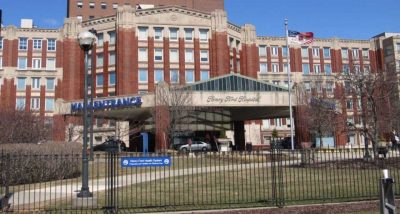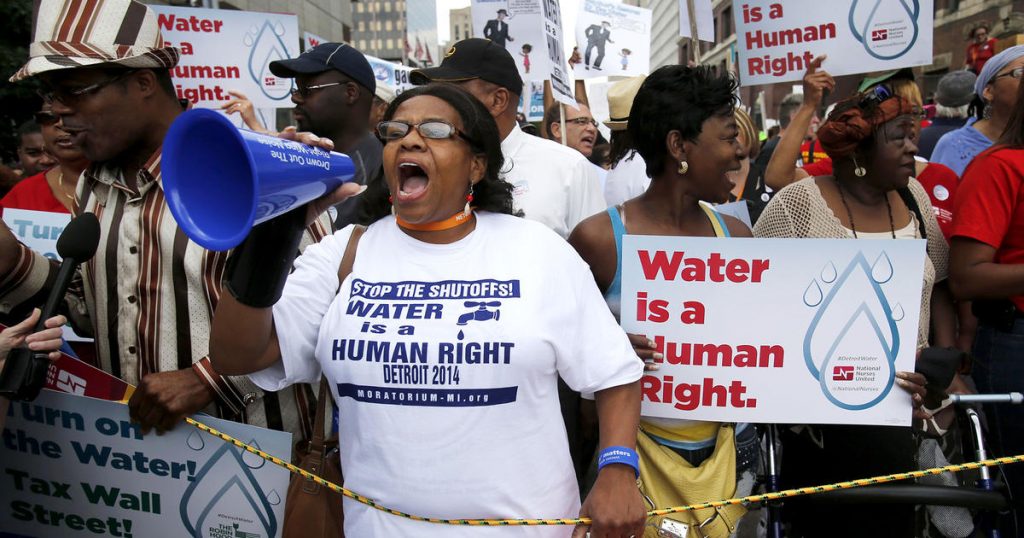Detroit Impacted Severely by COVID-19 Pandemic and Lockdown
Majority African American impoverished working class city mired in poverty facing monumental challenges

On March 12, Michigan Governor Gretchen Whitmer declared a state of emergency in Michigan ordering public buildings and educational institutions closed for three weeks.
By the Monday March 16, restaurants were closed for dining and open on a carry out basis only.
Streets soon became deserted in densely populated areas in Detroit and other major municipalities in southeastern Michigan and around the state. Later an order-in-place declaration went into effect encouraging people to remain indoors and to limit their movement to personal exercise outside the home and shopping for necessities such as food and medicines.
Food outlets providing assistance to poverty stricken residents were the scene of long lines and limited supplies. Over the course of the second and third weeks of March, millions were thrown out of work, many of whom are not eligible to collect unemployment benefits.
Detroit, which has undergone tremendous socio-economic upheaval over the last five decades, has been projected by the corporate media and local political officials as a center for financial revival and innovation. Yet the poverty rates among the majority African American population have remained constant during the recent period characterized by a contrived imposition of emergency management, municipal bankruptcy and privatization.
In regard to the actual COVID-19 cases in Detroit, the figures indicate that the city has the largest cluster of infections in the state. Many high-profile residents have fallen ill and died.
As of March 31, there were 7,615 confirmed cases of COVID-19 in the state of Michigan with 259 deaths. Most of the deaths have been in Wayne and Oakland counties which encompass and border the city of Detroit.
Makeshift testing centers have been established outside Beaumont Hospital in a suburb of Detroit, Farmington, and at the previous State Fairgrounds on Woodward Avenue inside the city. Hospitals are cautioning people to not come in unless the situation is serious. Many people have been diagnosed online through a process established by local medical centers.
Flint, another majority African American municipality, located 70 miles north of Detroit, has also been the center of numerous infections and deaths. The city suffered enormously under former Republican Governor Rick Snyder when emergency management was imposed in both Flint and Detroit which mandated the fracturing of the water systems leading to the poisoning of the nearly 100,000 residents.
A suburb of Detroit, Ecorse, is inflicted with a disproportionate number of COVID-19 confirmed cases. Hospitals throughout the Detroit metropolitan area are reaching capacity.
The transition of the TCF Conference Center located downtown on the Detroit River, is currently being converted into a makeshift field hospital in anticipation of a rapid surge in serious and critical cases. Other locations such as the Detroit Pistons training center located between the New Center area and Midtown is being repurposed as well.
Reports of COVID-19 cases are circulating through informal social media networks which paint a vivid portrait of social disruption and economic peril. Some have posted videos of themselves while ill discussing the symptoms and the progression of the illness. Others are celebrating their recovery as an encouragement to those who are still incapacitated.
According to Bridge Magazine published in the state of Michigan:
“Across metro Detroit, the epicenter of the coronavirus in Michigan, the pandemic has entered a new and terrifying phase. On Monday (March 31), Detroit’s infection rate and death toll skyrocketed with 259 newly confirmed cases, pushing the city’s total past 1,800, with 52 deaths. Across the three metro counties of Wayne, Oakland and Macomb, there are more than 5,200 cases and 158 deaths. Community leaders say it is becoming difficult to find a Detroiter who doesn’t know someone who is infected with the virus. Detroit politicians and civic figures are listed among the sickened or dead. Even the city’s police chief is barking orders from the solitude of quarantine.”
Poverty, Racism and National Oppression as Risk Factors
Detroit, Flint, Highland Park, Pontiac and other municipalities with majorities and near-majorities of African Americans have long been subjected to racist policy decisions which have left these communities disproportionately jobless, impoverished and disenfranchised. The absence of healthcare is a direct result of inadequate employment benefits and the failure of the United States to adopt a guaranteed national medical program which covers all people regardless of employment and income status.
The problem of testing in Detroit along with other cities is paramount. Testing on a mass scale has not been available. Patients have been requesting testing after exhibiting suspected symptoms of COVID-19. Nonetheless, the practice was to require those asking to be tested to present a prescription from their physician. Of course this ignores the reality that untold numbers of the population of Detroit are without healthcare coverage.
Now with public testing facilities established, this situation can be challenged by community organizations and healthcare advocates. Everyone should be eligible for testing largely because the overall public health of the city is at serious risk. With the closing of the City’s Health Department during the capital-driven emergency management and bankruptcy scheme during 2013-2014, previously housed at Herman Kiefer Hospital in the Virginia Park District on the west side, the administration of corporate-imposed Mayor Mike Duggan is limited in any attempt to mobilize a citywide response to the pandemic. If this pandemic had struck a decade ago, Herman Kiefer could have easily served as a mass testing and treatment location.
Moreover, the policies enacted by the state and city governments over the recent period have essentially degraded the capacity of the authorities to effectively address a crisis. Billions of dollars in abatements and tax captures have been awarded to the leading capitalist entities which have transform the downtown area and other districts into playgrounds for tourists and wealthier residents.
The corporate image projected nationally and internationally of the contemporary situation in Detroit does not take into consideration the continuing exploitation and oppression of the majority of city residents. Massive home foreclosures, evictions, utility shutoffs, water service terminations, the lack of adequate public transportation, gentrification, the rapid increase in property taxes and rents have left the masses in a state of disempowerment and marginalization.
People gather to protest against the mass water shut-offs to Detroit citizens behind in their payments, July 18, 2014.
Although the city administration claims that the rates of poverty has decreased in the city, a study just four years ago noted:
“’The number of extremely poor neighborhoods in the Detroit region grew almost fivefold between 2000 and 2010-14,’ said Elizabeth Kneebone, a fellow at the Brookings Institution’s Metropolitan Policy Program, who co-wrote the report. ‘In metro Detroit’s case, almost every neighborhood that crossed the 40% poverty rate threshold after 2000 did so as it shed population. … Poverty became more concentrated both as people with the means to move out of declining neighborhoods and as … the regional economy pushed more neighborhood residents below the poverty line.’”
Community Response to the Pandemic
Detroit organizations are attempting to keep up with the rapidly unfolding situation where communities are being further destabilized as a result of the healthcare and economic crises. Groups such as We the People of Detroit have been distributing water to people without service. The state and city has stated it is going to restore water to all residents in Detroit and around Michigan although the process is not taking place fast enough for activists and those directly affected.
The Moratorium NOW! Coalition and the Michigan Emergency Committee Against War & Injustice (MECAWI) have held their weekly organizing meetings by conference call since March 16. The organizations issued a set of demands calling upon Governor Whitmer to exercise her executive powers to guarantee housing, utilities, water, medical care and economic stability to all residents of the state of Michigan.
In cities such as Detroit and other Michigan municipalities, unemployment rates have skyrocketed. This is being replicated across the U.S. where many production and service facilities are closed along with educational institutions.
Within a matter of three weeks the number of infections have exceed 200,000 nationwide. Of that number, 4,500 have succumbed to the virus. Projections presented by U.S. governmental agencies and the White House Task Force, suggest that up to 2.2 million people could perish before the pandemic is arrested.
As the infection rates and deaths escalate, working people and the oppressed will be demanding concrete solutions to the social dislocation which is intensifying. Even with the current stimulus package passed by Congress, many workers, retirees, people with disabilities and their families and communities will be in need of radical social reconstruction policies.
*
Note to readers: please click the share buttons above or below. Forward this article to your email lists. Crosspost on your blog site, internet forums. etc.
Abayomi Azikiwe is the editor of Pan-African News Wire. He is a frequent contributor to Global Research.
Featured image: Detroit Henry Ford Hospital Main Campus in New Center area reaching capacity due to COVID-19 pandemic; all images in this article are from the author


